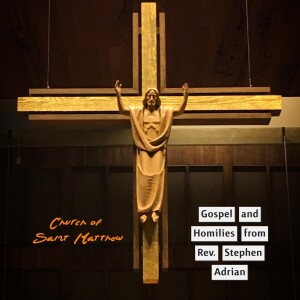
Wednesday Apr 19, 2023
09.13.2020 Homily
In one sense, the gospel story is about justice. We have the king, the land owner who has lent money out to servants, expecting a return on that loan and had a right to call that loan in. And he did, he was settling accounts. And there was one servant who had borrowed an extensive amount of money, so much money that he was clearly unable to repay. And so the King was going to ask that justice be done, that this man and his wife and his children, his property, that they'd be sold and the proceeds go toward meeting the debt. That's justice.
The man said, "I can't do it." He got down on his knees and he begged for mercy. And we're told that the King felt compassion. He forgave the debt and he freed the man. And that's the act of mercy.
You see justice in the teaching of Jesus is not enough. Justice is important and we owe justice to each other, but there's got to be something more than justice. And Jesus says it is mercy that always trumps justice. Mercy is always more important than justice. Mercy is the act by which the person who has offended me is not only forgiven, but that I take that person again into relationship with me. That whatever that is that stood between me and that person, that that be wiped away, that that person would be restored to the condition, to the place that he or she had before the offense was committed. That there be a restoration of the individual.
That's the work of mercy. And that's what Jesus says his heavenly father does. Every single one of us is a sinner. And every single one of us has come before the Lord God and has sought mercy. And in every single one of our cases, the Lord has poured forth His mercy upon us. He has restored us to relationship with Him. He's restored us as sons and daughters of the Father and sisters and brothers of Himself. Mercy before justice.
Toward the end of the Shakespearian play The Merchant of Venice, Portia is defending Shylock in the court, and she calls out for mercy. She says, "The quality of mercy is not strained. It drops like a gentle rain from heaven upon the place beneath. Mercy Is twice blessed. It blesses the one who gives and it blesses the one who receives. It becomes the throned monarch better than his crown. His scepter shows force in temporal power, but mercy is above the sceptered sway. It is enthroned in the heart of the king. It is an attribute to God Himself. The earthly power then shows the likeness of God when it is mercy that seasons justice."
We face in our day, in our time, in this country, a tremendous call for setting right what has been wrong. And the call is for justice. And yet it is not just justice that is going to reconcile. It's going to be justice that is laced with mercy.
In South Africa, after the end of apartheid when it was necessary for that society, black and white to come together, they established a process, a reconciliation process, a process by which the truth could be told and people could acknowledge their share in the pain that had taken place, the injustice. But that reconciliation process was built on the principle of mercy. It was not an eye for an eye and a tooth for a tooth, but it was to restore a nation. To restore the fabric of the society that had been rent apart. And that called for the willingness on the part of people to move beyond justice, and to themselves and to others extend the gift of mercy.
Remembering in the sense, what Shakespeare put in the mouth of Portia: "Mercy is twice blessed. It blesses the one who gives and it blesses the one who takes."
No comments yet. Be the first to say something!